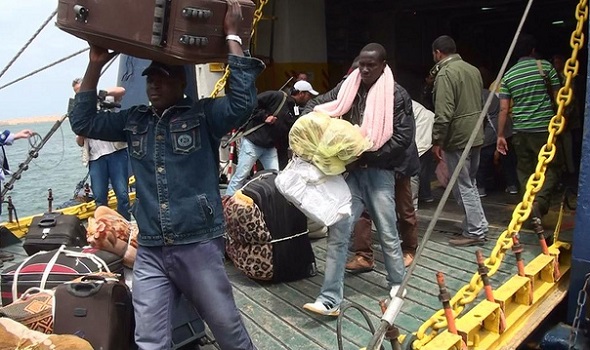The deals we make to control migration...
The deals we make to control migration...

Britain complains about “illegal immigration” but its own policy – like the policy in other European Union countries – is to put a squeeze on legal routes to entry.
For example, the UK’s refusal rate for Syrian visa applications has more than doubled from less than 30 per cent before the conflict started to more than 60 per cent in 2016.
“I didn’t try to apply for visa. Nobody gets a visa,” a Syrian traveller recently told a study. “I wish we could pay the embassy instead of the smuggler in order to come here.”
The policy means that people who are at risk have to travel through unsafe routes.
Instead of this counterproductive policy, Britain and other European countries should provide safe, legal migration routes and humanitarian protection, and stop pushing people into dangerous situations by paying untrustworthy governments to stop people leaving.
Libya is a prime example.
It is one of the main gateways for migrants trying to reach Europe. Through the years, there have been many deals between Libya and European countries, especially France and Italy, to control migration and intercept migrants before they can reach Europe.
In 2008, Italy pledged yet more billions of Euros to Muammar Gaddafi’s regime in return for tighter controls on migrants leaving Libyan shores. The agreement was seen as success, with the number of migrants crossing to Europe from Libya dropping from 40,000 in 2008 to 5,000 in 2010.
A deal with Turkey for the same reason, keeping people away from Europe shores came into force in 2016. Many articles and criticism have been published regarding this.
Such deals are not novel. Two years prior to the EU-Turkey deal, an agreement of the same nature took place between EU and Sudanese government in what is called the Khartoum process in an attempt to reduce the number of migrants from Sudan, Somali, Eretria and Ethiopia reaching Libya and eventually Europe.
Since the EU-Turkey deal, the Libya route has become even more active, so Italy renewed its collaboration with Libya to cut off migrants. Since February 2017, Italy has been providing training, vessels and other assistance to Libyan Coast Guards to capture migrants and refugees who are trying to reach Europe and return them to miserable situations in Libya. In the wake of this deal, there was a two third drop in the number of migrants reaching Europe from Libya.
The deal is dangerous because it has ended up pushing thousands of vulnerable people into notorious detention centres where they are widely ill-treated. Forced labour; violence and sexual abuse have been reported by people fleeing dictatorial regimes, war and persecution in the hope of finding a safer place to start a new life. In fact, these very people are in urgent need of protection.
Italy and other European countries tend to turn a blind eye to the appalling – and well-documented - situation in Libya, preferring to give priority to working with Libya to prevent migrants from using Libya as a transit point.
“We cannot be a silent witness to modern-day slavery, rape and other sexual violence, and unlawful killings, in the name of managing migration and preventing desperate and traumatised people from reaching Europe’s shores,” Zeid Ra’ad al-Hussein, head of the Office of the UN High Commissioner for Human Rights, has said.
Following a CNN report on slave markets in Libya in November, many governments, including members of the African Union, felt the need to step in by proposing the repatriation of migrants from Libya. Last year, 19,370 people were returned to their country of origin and a few hundred were resettled in Italy and France. There is no guarantee that these people are safe and have not faced persecution or mistreatment in those countries.
European nations should think more of their humanitarian obligations and lend a hand to vulnerable people, not make questionable international deals to externalise their borders.


